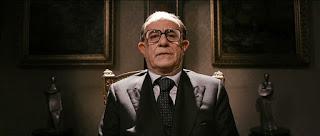
"Power wears out those who don't have it."
Italian politics strikes outsiders as a wild, inscrutable circus. Perhaps that's why Il Divo (2008) is such a bizarre beast. Paolo Sorrentino's off-kilter biopic of the notorious Giulio Andreotti is less a biopic than a bewildering collage of postwar Italy, a battleground of political extremism, moral compromise and .Il Divo depicts the downfall of Andreotti (Toni Servillio), seven-time Prime Minister, Senator for Life and Italy's most influential and feared politician. In 1992, Andreotti loses a presidential bid amidst Christian Democrat in-fighting and bribery accusations. Journalists probe Andreotti's shady dealings with the Vatican and CIA, and his ties to P2, a Masonic lodge consisting of high-level Italian officials. Then a prosecutor brings charges of complicity with organized crime.
It's hard to fit Il Divo into any box. Sorrentino starts with a frenetic Scorsese-lite style, from the fast-paced editing to several murders set to rock music. The film settles into a more experimental format, favoring long takes, swooping zooms and POV shots; Luca Bigazzi's camera has a restless energy, searching out walls, rooms, exteriors for telling, splashing detail. This makes Andreotti a chameleon, unchanging against garish backgrounds and backstabbing underlings. This culminates in a shot of Andreotti reduced to grayscale, an immovable, inscrutable fixture.
Il Divo's fragmented narrative may frustrate those unversed in Italian history. Andreotti's crimes are discussed rather than depicted; he's complicit in everything from Operation Gladio and Salvatore Giuliano's murder to the '80s Vatican Bank scandal (more recognizable thanks to The Godfather, Part III and The Bankers of God), and allowed the Red Brigades to murder his colleague, Aldo Moro in 1978. Without detailed backstory, viewers grow lost in a thicket of names and accusations. Yet this seems partly the point; Sorrentino isn't trying for an understanding, but an impressionist portrait of Italian politics.
Certainly, Il Divo's no more conventional as political procedural than biopic. We're introduced to Andreotti curing migraines through acupuncture, invoking Hellraiser's Pinhead. Then the comic opera scenes in Italy's Parliament, politicians trading threats and insults, then shamelessly bartering votes. His associates are a feisty lot, from his nervy Chancellor (Carlo Buccirosso) to his secretary (Piera Degli Esposti) collecting constituent's love letters. Nor is Il Divo shy about labeling ironies: as a journalist (Giulio Bosetti) lists Andreotti's crimes, the Premier reminds him that he saved the paper from Silvio Berlusconi!
Then there's Toni Servillo, a hangdog Latinate Alec Guinness with drooping ears, mischievous smile and horn-rimmed glasses. He delivers quips in monotone and subtle gestures, repetitive but never devolving to shtick. Servillo shows humanity in his marriage to Livia (Anna Bonaituo), favors for constituents, remorse over Moro's death. This culminates in an extraordinary "confession," defending his crimes as necessary to save Italy from extremism. Servillo makes Andreotti less power-mad monster than monstrous pragmatist.
Il Divo takes this message to heart, without condoning it. If Andreotti's a villain, he's less Machiavelli than the product of an unpleasant time and place. Shortly after the film's events, Italy's First Republic collapsed, taking with it the Christian Democrats. Andreotti died in 2013, witnessing an equally fractious Second Republic riven by identical problems.

